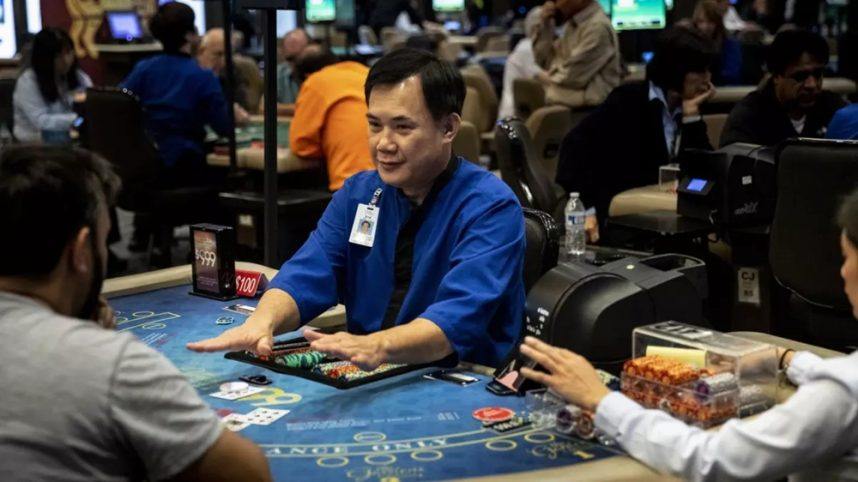A lawsuit filed by a coalition of California tribal operators accuses the cardroom industry of offering illegal gambling in violation of the state constitution and the California Penal Code.
 A dealer deals blackjack at the Garden Casino in Hawaiian Gardens, Calif., with the rotating banker position to his left. The card room is one of dozens named in the tribes’ lawsuit. (Image: LA Times)
A dealer deals blackjack at the Garden Casino in Hawaiian Gardens, Calif., with the rotating banker position to his left. The card room is one of dozens named in the tribes’ lawsuit. (Image: LA Times)The suit, filed January 1 in the California Superior Court, could be the first of many such complaints against the cardrooms. The tribes have long complained that some of the games offered by these venues are illegal and violate tribal exclusivity on house-banked casino games, but they have previously lacked the legal recourse to challenge them.
Generally speaking, state courts lack jurisdiction over tribes, which are sovereign nations. Meanwhile, federal courts tend not to interfere with California’s internal gaming laws.
California GamesLast year, California Governor Gavin Newsom signed the , which opens a window for the tribes to apply to the courts for limited declaratory relief. While they cannot claim monetary damages, they can seek a determination on the legality of the games.
The lawsuit is signed by seven of the state’s 63 tribal operators, including the Agua Caliente Band of Cahuilla, the Pechanga Band of Indians, the Kumeyaay Nation, and the San Manuel Nation.
The object of the tribes’ vexation is so called “California games.” These versions of popular casino table games like blackjack and pai gow poker aim to dodge the ban on house-banked games by taking a rake from each hand. They also allow players to play in a rotating dealer position — just like in a regular poker cash game.
But most of the game rules, either as written or by card room interpretation, do not require actual rotation of the bank — merely the offering of it,” the suit complains. “Thus, a single player may bank the game uninterrupted, just as in Nevada and New Jersey style banked games, when no other player accepts an offer to bank.”
Don’t Bank on ItThe cardrooms also hire state-licensed third parties to “shill” in the dealer spot because players don’t always want to act as the dealer. The tribes argue that these companies, known as TPPPs, are a de facto “bank” when combined with the card rooms’ “refusal and failure” to rotate the bank from player-to-player.
“The California Constitution grants tribes the exclusive right to offer blackjack, baccarat, and other banked games in tribal casinos,” Adam Lauridsen, an attorney for the tribes, told Casino.org in a statement Thursday.
As part of exercising their rights, tribes have collectively contributed hundreds of millions to the California state budget through gaming-compact payments and provided crucial services to broad communities, continued Lauridsen. Cardrooms have brazenly rejected this voter-approved framework and instead forged ahead with offering illegal Vegas-style games.”
The California Gaming Association, which advocates for the cardrooms, has that without California games, many cardrooms would be forced to close, potentially costing thousands of jobs.


